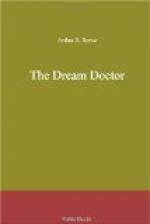“You remember my use of the sphygmomanometer?” he asked. “In the first place that put me on what seems to be a clear trail. The most dreaded of all the ills of the cardiac and vascular systems nowadays seems to be arterio-sclerosis, or hardening of the arteries. It is possible for a man of forty-odd, like Mr. Pitts, to have arteries in a condition which would not be encountered normally in persons under seventy years of age.
“The hard or hardening artery means increased blood pressure, with a consequent increased strain on the heart. This may lead, has led in this case, to a long train of distressing symptoms, and, of course, to ultimate death. Heart disease, according to statistics, is carrying off a greater percentage of persons than formerly. This fact cannot be denied, and it is attributed largely to worry, the abnormal rush of the life of to-day, and sometimes to faulty methods of eating and bad nutrition. On the surface, these natural causes might seem to be at work with Mr. Pitts. But, Walter, I do not believe it, I do not believe it. There is more than that, here. Come, I can do nothing more to-night, until I learn more from these animals and the cultures which I have in these tubes. Let us take a turn or two, then dine, and perhaps we may get some word at our apartment from Edward.”
It was late that night when a gentle tap at the door proved that Kennedy’s hope had not been unfounded. I opened it and let in Edward, the valet, who produced the fragments of a note, torn and crumpled.
“There is nothing new, sir,” he explained, “except that Mrs. Pitts seems more nervous than ever, and Mr. Pitts, I think, is feeling a little brighter.”
Kennedy said nothing, but was hard at work with puckered brows at piecing together the note which Edward had obtained after hunting through the house. It had been thrown into a fireplace in Mrs. Pitts’s own room, and only by chance had part of it been unconsumed. The body of the note was gone altogether, but the first part and the last part remained.
Apparently it had been written the very morning on which the murder was discovered.
It read simply, “I have succeeded in having Thornton declared ...” Then there was a break. The last words were legible, and were,"... confined in a suitable institution where he can cause no future harm.”
There was no signature, as if the sender had perfectly understood that the receiver would understand.
“Not difficult to supply some of the context, at any rate,” mused Kennedy. “Whoever Thornton may be, some one has succeeded in having him declared ‘insane,’ I should supply. If he is in an institution near New York, we must be able to locate him. Edward, this is a very important clue. There is nothing else.”
Kennedy employed the remainder of the night in obtaining a list of all the institutions, both public and private, within a considerable radius of the city where the insane might be detained.




